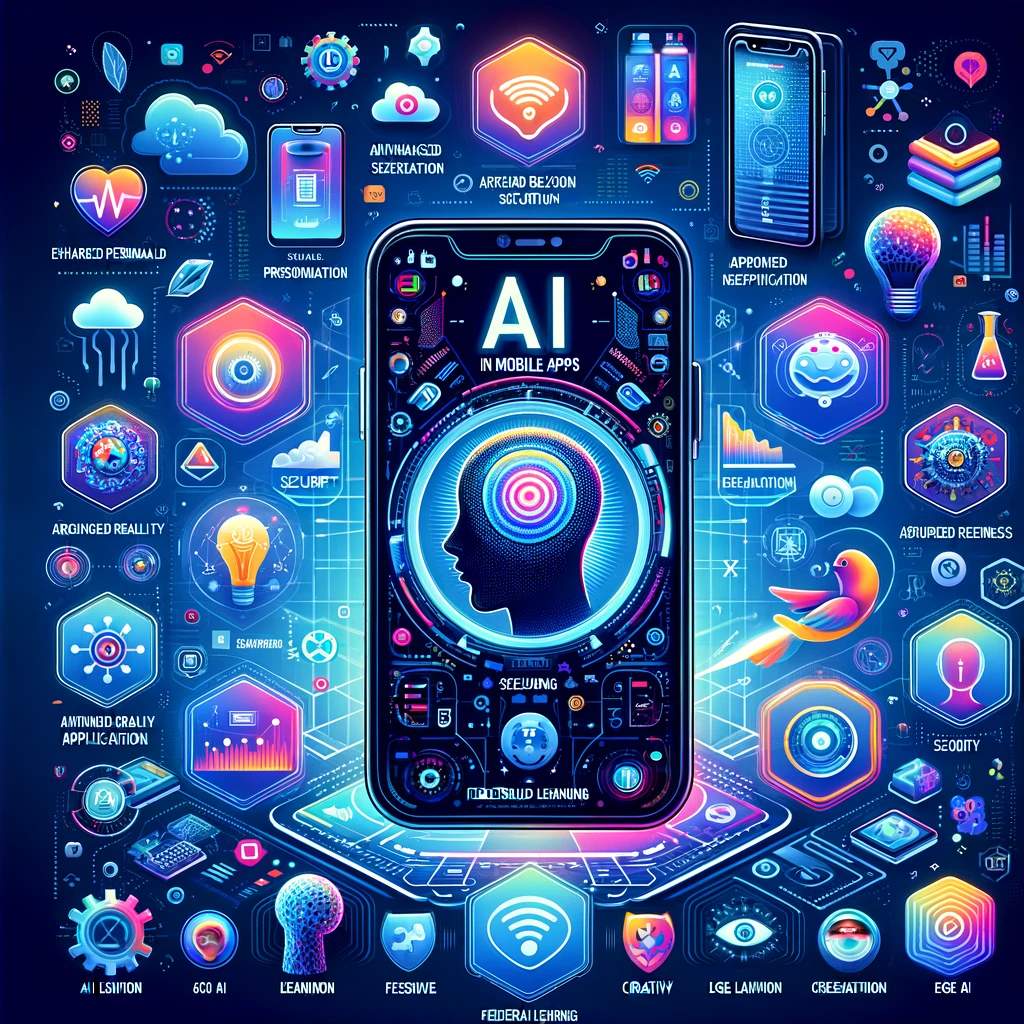Introduction
Artificial Intelligence (AI) has been a game-changer in the world of mobile applications, revolutionizing the way we interact with technology. As we step into 2024, the integration of AI in mobile apps is set to reach new heights, bringing forth emerging trends and revolutionary advancements that promise to enhance user experiences and drive innovation. In this blog post, we will explore the evolution of AI in mobile apps and delve into the exciting trends and advancements that are shaping the industry this year.
The Rise of AI in Mobile Apps
AI has come a long way from its early days of simple automation and basic machine learning. Today, AI-powered mobile apps are capable of performing complex tasks, learning from user interactions, and providing highly personalized experiences. The rapid advancement in AI technologies, such as natural language processing (NLP), computer vision, and deep learning, has paved the way for mobile apps that are more intuitive, efficient, and user-friendly.
Emerging Trends in AI for Mobile Apps in 2024
- Enhanced Personalization AI-driven personalization is no longer a novelty but a necessity for mobile apps. In 2024, apps are leveraging AI to deliver hyper-personalized experiences. By analyzing user behavior, preferences, and patterns, AI can predict user needs and tailor content, recommendations, and services accordingly. This level of personalization not only enhances user satisfaction but also increases engagement and retention rates.
- Advanced Voice Assistants Voice assistants have become an integral part of our daily lives, and in 2024, they are getting smarter and more efficient. AI advancements in NLP and speech recognition are enabling voice assistants to understand context, handle complex queries, and provide more accurate responses. This trend is making voice-driven interactions more natural and seamless, paving the way for a hands-free user experience.
- AI-Powered Security With the increasing reliance on mobile apps for sensitive transactions and personal information, security is a top priority. AI is revolutionizing mobile app security by detecting and preventing fraudulent activities in real-time. Machine learning algorithms analyze user behavior and identify anomalies that could indicate security threats. Biometric authentication, powered by AI, is also becoming more sophisticated, offering enhanced protection against unauthorized access.
- Augmented Reality (AR) Integration AI and AR are converging to create immersive and interactive experiences. In 2024, mobile apps are leveraging AI to enhance AR capabilities, providing users with real-time information, object recognition, and contextual overlays. This trend is particularly evident in retail, gaming, and navigation apps, where AI-driven AR is transforming the way users interact with their environment.
- Health and Wellness Applications AI is making significant strides in the health and wellness sector. Mobile apps are utilizing AI to monitor health metrics, provide personalized fitness recommendations, and even predict potential health issues. AI-powered chatbots and virtual health assistants are offering users round-the-clock support and guidance, making healthcare more accessible and convenient.
- Improved User Interfaces AI is playing a crucial role in designing intuitive and adaptive user interfaces. In 2024, mobile apps are incorporating AI to analyze user interactions and optimize UI/UX design. This ensures that apps are easy to navigate, visually appealing, and responsive to user needs. AI-driven UI improvements are enhancing overall user satisfaction and engagement.
Revolutionary Advancements in AI for Mobile Apps
- Federated Learning Federated learning is a groundbreaking advancement in AI that allows mobile apps to improve their algorithms without compromising user privacy. Instead of sending user data to a central server, federated learning enables apps to train AI models locally on users’ devices. This not only enhances data security but also reduces latency, making AI-driven features more efficient and responsive.
- AI-Driven Creativity AI is pushing the boundaries of creativity by generating content, art, and music. In 2024, mobile apps are harnessing AI to assist users in creating unique content, from personalized playlists to digital art pieces. AI-driven creative tools are empowering users to explore their creativity and produce high-quality outputs with minimal effort.
- Emotion Recognition AI is becoming more adept at recognizing and responding to human emotions. Emotion recognition technology is being integrated into mobile apps to provide empathetic and context-aware interactions. For instance, customer service apps can detect user frustration and adapt their responses accordingly, enhancing user satisfaction and building stronger emotional connections.
- 5G and Edge AI The rollout of 5G technology is accelerating the adoption of edge AI, where data processing occurs on the device rather than in the cloud. This advancement is enabling real-time AI applications with minimal latency. Mobile apps are leveraging edge AI to deliver faster and more reliable services, from augmented reality experiences to instant language translation.
Conclusion
The evolution of AI in mobile apps is transforming the way we interact with technology, making it more personalized, secure, and efficient. In 2024, emerging trends such as enhanced personalization, advanced voice assistants, AI-powered security, and AR integration are shaping the future of mobile applications. Revolutionary advancements like federated learning, AI-driven creativity, emotion recognition, and 5G-powered edge AI are set to redefine the mobile app landscape. As AI continues to evolve, mobile apps will become smarter, more intuitive, and indispensable in our daily lives, driving innovation and growth in the digital era.



